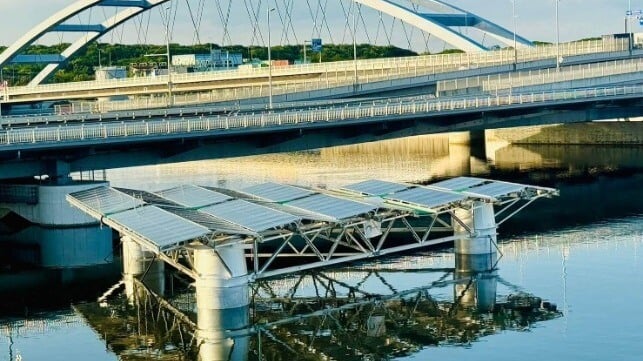Floating Solar Startup SolarDuck Completes Installation in Tokyo

Renewable power startup SolarDuck has completed the installation and commissioning of a floating solar demonstration project in the Tokyo Bay area.
In cooperation with Kyocera Communication Systems, Everblue Technologies and Tokyu Land Corporation, SolarDuck was selected in 2022 to carry out a demonstration of its solar power infrastructure in Tokyo's Central Breakwater district. The trial-size installation measures about 30 meters square, and will generate power for charging an energy storage battery bank in the Takeshiba area. Possible uses include powering Open Street Corporation's electric bikes, and providing charging for an electric boat. A temporary demonstration of the bike-charging power application is scheduled for May 12-21.
SolarDuck has ambitious plans for generating power at sea. The company's floating panel arrays can be integrated into offshore wind farm developments, but are also designed to work on their own in wind-poor, sun-rich waters - like those in Tokyo's inner harbor. This could allow densely-populated coastal areas to access solar power without giving up valuable shoreside real estate.

that matters most
Get the latest maritime news delivered to your inbox daily.
SolarDuck wants to deploy one gigawatt worth of floating solar capacity by 2030, and it says that it already has a project pipeline totaling 3.5 gigawatts at locations around the world. Work is under way on a small demonstrator project for RWE's Hollandse Kust West VII offshore wind farm in the Dutch sector of the North Sea, where surface conditions will be far rougher than in Tokyo's inner harbor. When completed, this will be the largest floating offshore solar plant ever built. It will soon be followed by a 120 MW farm in the Gulf of Taranto, supported by Green Arrow Capital and New Developments.
SolarDuck benefits from financial support from Katapult Ocean, Green Tower, Energy Transition Fund Rotterdam and Invest-NL, which have invested a combined $15 million in its R&D efforts. It recently secured the world's first prototype certification for an offshore floating solar system from Bureau Veritas.
